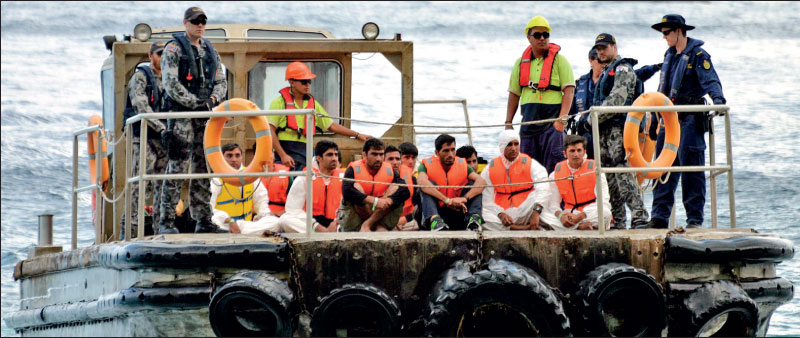Saturday Feb 28, 2026
Saturday Feb 28, 2026
Wednesday, 8 June 2022 00:23 - - {{hitsCtrl.values.hits}}

The power of knowledge and access to information will be key in countering or reducing the incidence of human trafficking
 As the economic crunch, compounded by the effects of the long-drawn COVID-19 pandemic is felt by millions of Sri Lankans, migrating in search of ‘greener pastures’ will become a more common coping strategy. Both men and women will seek out higher-paying jobs in the urban centres or in different countries of West Asia or beyond but in doing so, may fall prey to intermediaries whose promises of jobs can lead to exploitation.
As the economic crunch, compounded by the effects of the long-drawn COVID-19 pandemic is felt by millions of Sri Lankans, migrating in search of ‘greener pastures’ will become a more common coping strategy. Both men and women will seek out higher-paying jobs in the urban centres or in different countries of West Asia or beyond but in doing so, may fall prey to intermediaries whose promises of jobs can lead to exploitation.
Alarm bells have been already raised regarding the increase in human trafficking as desperate Sri Lankans attempt to migrate at any cost. An inter-connected yet equally important question to ask, is whether Sri Lanka’s service delivery systems are equipped to respond in a meaningful manner to support victims of human trafficking.
For victims who have experienced any form of violence, gaining access to the correct services at the correct time is essential to help them deal with the trauma they have experienced. For victims of human trafficking who have been deceived, transported, and have undergone labour or sexual exploitation – receiving such services is critical as the trauma can leave long-term scars. Whether Sri Lanka’s existing service framework is able to extend support to a rising number of victims is a question that requires to be investigated. Research conducted by the Centre for Poverty Analysis, in collaboration with The Asia Foundation during the height of the pandemic, sought answers to these very questions.
A key strength in Sri Lanka is that existing laws and policies in place provide adequate protection for victims of violence. Support services available to victims include, legal aid, economic and livelihood support, counselling, and shelter services. However, government and non-governmental service providers and law enforcement officials pointed out the inherent challenges individuals face in accessing these services.
First, access and the availability of these services vary, depending on the location. For example, Nuwara Eliya has no dedicated shelter even though migration rates from this district are considered to be very high, as is gender-based violence (GBV). This heightens the vulnerability a victim encounters and may compel the person to remain in an exploitative, or violent situation. Second, the existing services mostly target victims of domestic violence and women who have experienced some form of GBV – excluding men who are generally seen as the perpetrators of violence rather than victims. This is despite mounting evidence that men are as vulnerable to be trafficked as women and children. Similarly, gay, lesbian and trans-gender individuals as well as sex workers are largely excluded from accessing services, because they are seen as law breakers rather than as victims. This is despite existing policies treating different forms of violence as gender neutral.
More worryingly, even if such marginalised groups manage to access some form of assistance, being referred to services is heavily dependent on whether the victim has been correctly identified – a challenge in the case of human trafficking as organisations that provide these services have a weak understanding of what human trafficking entails. In this context, individuals belonging to already marginalised groups face insurmountable hurdles in accessing services.
An equally pressing issue is the lack of funding to provide the necessary services to victims of violence. For the government, the demotion of the Ministry of Women and Child’s Affairs to a State Ministry has had rippling effects on officers on the ground who struggle to extend livelihood support to identified victims. On the other hand, non-governmental agencies are in competition for the same pot of funding as the focus on assisting victims of violence becomes less of a priority in the funding arena.
The economic crisis has further heightened existing disparities, even for services such as public health that were largely accessible for all victims regardless of the form of violence they had experienced. The present status of Sri Lanka’s public health system however, will force officials to prioritise the more immediate, critical and visible health concerns. This may happen at the cost of receiving much needed psycho-social counselling and other health-related support for victims of violence, including of human trafficking.
In this current socio-economic context therefore, the existing service framework may struggle to cope as addressing the basic needs of Sri Lankans will be the main priority. While the situation may be dire, is there space for engagement which would help reduce the vulnerabilities that victims would potentially encounter? The power of knowledge and access to information will be key in countering or reducing the incidence of human trafficking.
Social media and its outreach can act as strong tools at our disposal to target and create awareness on human trafficking more broadly among migrant workers, and in particular with youth who are seeking work locally or overseas. Similarly, equipping the existing service providers with the same knowledge, can lead to more awareness of what human trafficking entails. These seemingly basic steps can eventually be translated to strong preventative measures which will have a positive impact on lessening the incidence of human trafficking.
(The writer is a Senior Researcher, Centre for Poverty Analysis (CEPA).)